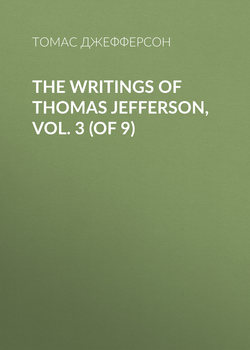Читать книгу The Writings of Thomas Jefferson, Vol. 3 (of 9) - Томас Джефферсон, Thomas Jefferson - Страница 11
PART II.—Continued.
LETTERS WRITTEN WHILE IN EUROPE.
1784-1790
[Extract of the letter from Thomas Paine, referred to in the preceding, to General Washington.]
Оглавление"London, March the 12th, 1789. I do not think it is worth while for Congress to appoint any minister at this court. The greater distance Congress observes on this point, the better. It will be all money thrown away, to go to any expense about it, at least during the present reign. I know the nation well, and the line of acquaintance I am in, enables me to judge better on this matter than any other American can judge, especially at a distance. I believe I am not so much in the good graces of the Marquis of Lansdowne as I used to be. I do not answer his purpose. He was always talking of a sort of re-connection of England and America, and my coldness and reserve on this subject checked communication. I believe he would be a good minister for England, with respect to a better agreement with France."
(Same letter continued) "April 10. The acts for regulating the trade with America are to be continued as last year. A paper from the Privy Council respecting the American fly, is before parliament. I had some conversation with Sir Joseph Banks upon this subject, as he was the person whom the Privy Council referred to. I told him that the Hessian fly attacked only the green plant, and did not exist in the dry grain. He said, that with respect to the Hessian fly, they had no apprehension, but it was the weavil they alluded to. I told him the weavil had always, more or less, been in the wheat countries of America, and that if the prohibition was on that account, it was as necessary fifty or sixty years as now; that I believed it was only a political manœuvre of the ministry to please the landed interest, as a balance for prohibiting the exportation of wool, to please the manufacturing interest. He did not reply, and as we are on very sociable terms, I went farther, by saying, the English ought not to complain of the non-payment of debts from America, while they prohibit the means of payment. I suggest to you a thought on this subject. The debts due before the war ought to be distinguished from the debts contracted since, and all and every mode of payment and remittance under which they might have been discharged at the time they were contracted, ought to accompany those debts so long as any of them shall continue unpaid, because the circumstances of payment became united with the debt, and cannot be separated by subsequent acts of one side only. If this was taken up in America, and insisted on as a right coëval with and inseparable from those debts, it would force some of the restrictions here to give way. While writing this, I am informed that the minister has had a conference with some of the American creditors, and proposed to them to assume the debts, and give them ten shillings in the pound. The conjecture is, that he means, when the new Congress is established, to demand the payment. If you are writing to General Washington, it may not be amiss to mention this, and if I hear further on this matter, I will inform you. But as, being a money matter, it cannot come forward but through parliament, there will be notice given of the business. This would be a proper time to show, that the British acts since the peace militate against the payment, by narrowing the means by which those debts might have been paid when they were contracted, and which ought to be considered as constituent parts of the contract."
